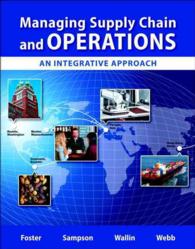- ホーム
- > 洋書
- > 英文書
- > Politics / International Relations
基本説明
New in paperback. Hardcover was published in 2008. Drawing on both theoretical debates and case studies from around the world. This book explores how the politics of reconciliation relates to various models of democratic citizenship.
Full Description
Most countries around the world exhibit a long history of exclusion and discrimination directed against ethnic, racial, national, religious, or ideological groups. The underlying justifications for these forms of exclusion have been increasingly discredited by the post-war human rights revolution, decolonization, and by contemporary norms of liberal-democratic constitutionalism, with their commitment to equal rights and non-discrimination. However, even as these older practices and ideologies of exclusion are discredited and repudiated, they continue to have enduring effects. The legacies of exclusion can still be seen in a wide range of social attitudes, cultural practices, economic and demographic patterns, and institutional rules that obstruct efforts to build genuinely inclusive societies of equal citizens. Finding ways to overcome this problem is a major challenge facing virtually every society around the world. This book focuses on two parallel intellectual and political movements that have arisen to address this challenge: the 'politics of reconciliation', with its focus on reparations, truth-telling and healing amongst former adversaries, and the 'politics of difference', with its focus on the recognition and empowerment of minorities in multicultural societies. Both the politics of reconciliation and the politics of difference are having a profound impact on the theory and practice of democracy around the world, but remarkably little has been written about the relationship between them. This book aims to fill that gap. Drawing on both theoretical analysis and case studies from around the world, the authors explore how the politics of reconciliation and the politics of difference often interact in mutually supportive ways, as reconciliation leads to more multicultural conceptions of citizenship. But there are also important ways in which the two may compete in their aims and methods. This book is the first attempt to systematically explore these areas of potential convergence and divergence.
Contents
1. Introduction: Struggles for Inclusion and Reconciliation in Modern Democracies ; 2. Reconciliation Reconceived: Religion, Secularism, and the Language of Transition ; 3. Reconciling Historically Excluded Social Groups: Deliberative Democracy and the Politics of Reconciliation ; 4. Reconciling History and Equal Citizenship in Israel: Democracy and the Politics of Historical Denial ; 5. Act & Fact: Slavery Reparations as a Democratic Politics of Reconciliation ; 6. 'The Very Basis of Civility': On Agonism, Conquest and Reconciliation ; 7. Under Western Eyes: 'Into the Heart of Africa', Colonial Ethnographic Display, and the Politics of Multiculturalism ; 8. The Jurisprudence of Reconciliation: Aboriginal Rights in Canada ; 9. Gender and Collective Reparations in the Aftermath of Conflict and Political Repression ; Bibliography ; Index








